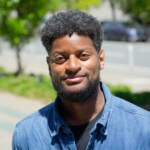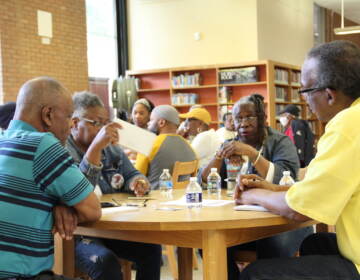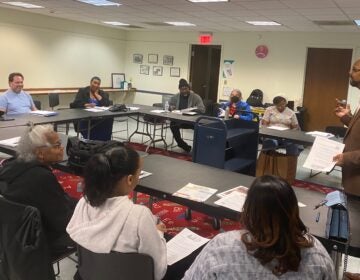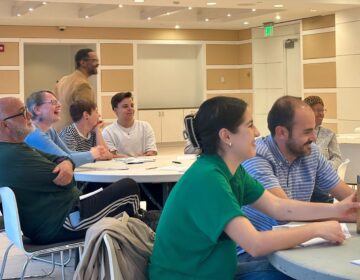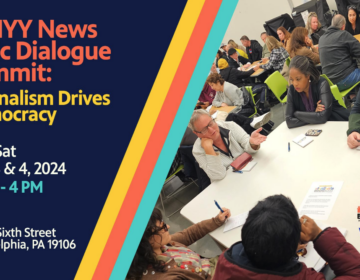South Philly residents discuss supervised injection sites at Bridging Blocks event
Opponents and supporters of supervised injection sites gathered at South Philadelphia Library to plead their case on the best solutions for opioid addiction.
Listen 1:27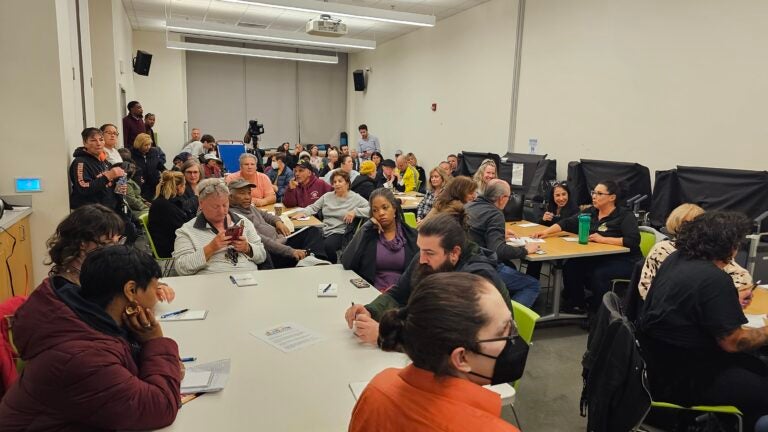
Attendees sit in group sessions to discussion questions and concerns amongst themselves on safe injection sites at South Philadelphia Library (Eric Marsh/WHYY)
From Philly and the Pa. suburbs to South Jersey and Delaware, what would you like WHYY News to cover? Let us know!
Two months after Philadelphia City Council voted to prohibit supervised injection or safe consumption sites, some city residents are concerned about what happens next.
“It would help if we gave people a safe place to use and make sure that if they overdose, they don’t die,” said Sterling Johnson.
Johnson was one of 70 attendees who participated in a community discussion on safe injection sites at South Philadelphia Library, hosted by WHYY’s Bridging Blocks team.
He was among a handful of people, mostly from South Philadelphia, who voiced their support of supervised injection sites, lobbying for a reversal of the city’s policy.
“I got healthy at outpatient treatment, and that’s what worked for me,” he said. “But, I’m not gonna say that because something worked for me, we need to cut off all other things.”
The discussion over supervised safe drug consumption sites is personal for some South Philadelphia residents, and dates back three years ago.
In 2020, then-City Councilmember David Oh introduced a bill opposing plans to open ‘Safehouse,’ a future supervised injection site along South Broad Street.
Oh’s bill gained widespread support among city council members, and plans to open the site were put on pause.
Harm reduction experts argue that supervised injection sites prevent fatal overdoses and reduce the spread of infectious diseases.
Safehouse would have provided individuals using illicit drugs with a penalty-free, safe location to use under the supervision of medical professionals. At the time, it would have been the first of its kind to open in the U.S.
Despite city council voting 13-1 to effectively prohibit safe injection sites across most of Philadelphia, some attendees at Monday evening’s event were not convinced that different solutions have been put on the table.
When revisiting the idea of a supervised injection site, particularly in South Philly, the discussion became fiery and personal.
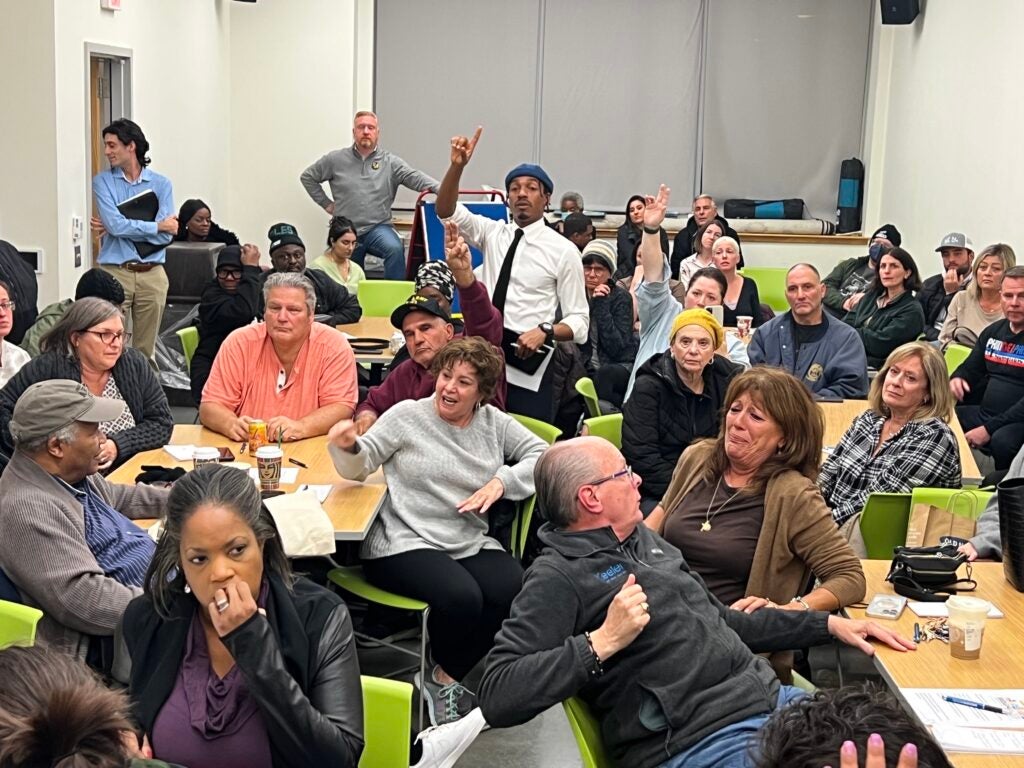
“The police district is short on staff, teachers are short on staff – everybody is short on staff! Who’s gonna patrol our community bringing in the people who are addicted?” asked one South Philadelphia resident in attendance.
“I lost a sister and brother to drug overdose, I remember coming up – there was a time where you would say, ‘stop enabling them [people struggling with addiction],” said another attendee. “They have to reach the bottom. If I’m always catching you, you’re never going to reach the bottom. Something has to make you get tired of living that way.”
Kim Silvasy-Neale is a clinical social worker, a South Philadelphia resident, and has done harm reduction for 20 years. In a breakout group session, she explained that beyond supervised injection sites, it’s critical for the city’s next mayor to embrace harm reduction to fight the opioid crisis.
“Addiction is just a maladaptive coping strategy and we all have addiction whether it’s shopping work or substance use drinking,” she said. “We have no problem with drinking,” she said. “We have bars where people can drink collectively in a safe environment, but people can’t shoot dope. That’s a problem.”
Richard and Stacey Brandt, husband and wife, have lived in South Philadelphia for 22 years. They have immediate family members affected by drug addiction, including Richard’s brother who died from addiction.
“I went through a lot of trauma over the years,” he said. “I’ve seen a lot of people that I know who died from drugs. I do not believe giving someone a place to shoot drugs or giving them a supply of drugs is a good thing.”
His wife, Stacey, agreed.
“I’m concerned about my neighborhood and the safety,” she said. “I also have brothers and sisters that were hooked on drugs. I’ve seen what it can do to you and I don’t believe that giving more is going to make anything better.”
But most attendees on Monday night agreed on one thing: Philadelphians struggling with addiction need help, whether there’s a supervised injection site in the city or not. And some people offered alternative solutions to help the problem.
“I was asking people as they came out, ‘if they put a safe injection site at the old Hahnemann, would you be okay with that?’” said event attendee Max Rayriek. “Some people said, ‘I don’t really think a safe injection site is a good idea. I don’t really support it. But if it was in Hanemann, I wouldn’t stand against it because it’s not in the neighborhood bringing drug dealers to the neighborhood.’”
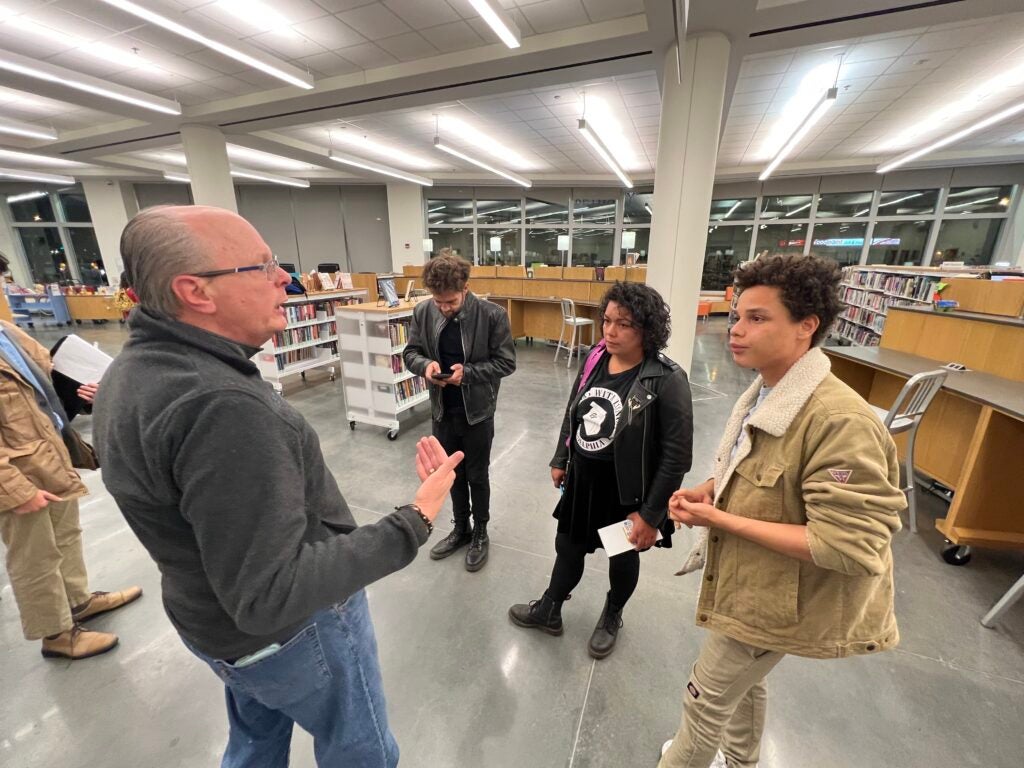
Among the attendees was Pennsylvania state Senator Anthony H. Williams, who called the opioid crisis one of the more significant issues that the city has had to deal with. He was also pleased with the common ground that most people felt about helping people suffering from addiction.
“There’s a desire to find people to get through recovery. There’s an understanding – even for the people for safe injection sites – that they understand safe injections alone will not fix the problem,” he said. “That along with a few other things was enlightening and productive.”
Bridging Blocks is a civic engagement initiative and collaboration between WHYY and The Free Library of Philadelphia. The next event will cover Early Childhood Sex Education on Tuesday, December 12 at Chestnut Hill Library, from 5:00 to 6:30 PM.
Bridging Blocks is made possible by a generous donation from The Sutherland Family.

Get daily updates from WHYY News!
WHYY is your source for fact-based, in-depth journalism and information. As a nonprofit organization, we rely on financial support from readers like you. Please give today.


